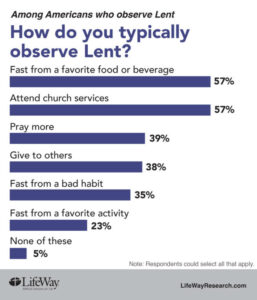Although Ash Wednesday marked the first day of Lent, many Protestants consider it to be primarily a Catholic season. The commemoration, however, is finding growing popularity among Protestants looking to bring a greater spiritual focus on Easter and the season leading up to it.
Skepticism about the season, reports Christianity Today, “is based mostly on myths and misconceptions.” Polls show attitudes are changing.
A 2017 LifeWay poll found that while 2 in 3 Catholics observe Lent, a whopping 1 in 3 Evangelicals do. Among protestants overall, 1 in 5 observe Lent. It also found that if you attend church at least once a month, you’re more likely to observe Lent (including 82% of Catholics and 30% of protestants).
The study revealed that many Evangelicals and other Protestants may not proclaim they’re celebrating Lent (by attending an Ash Wednesday service) but they say they go to church more often during the season. “Those with evangelical beliefs (71 percent) are more likely to go to church during Lent than those without evangelical beliefs (54 percent).
The Evangelical Gospel Coalition encourages Christians to participate. In 2013, Chuck Colson wrote, “I invite you to a holy Lent. Take up the opportunity to dwell upon the grief of our broken world, the sin within your heart, and the deep love of God that exceeds these realities. Reflecting on the hospitality of God, consider the needs of your neighbor, especially those without life’s basic needs. And, most importantly, in the gritty details of Lent, don’t forget—Easter is coming!”
Reverend Scott Gunn agrees and shared his insights into the observance in an op-ed piece.
“People give up chocolate or stop watching a favorite TV show or some other form of self-inflicted hardship,” he said. “But there’s more to Lent than meets the eye.”
The season of Lent began almost 2,000 years ago, primarily as a time to prepare for Easter. Those who were to be baptized were prepared during this time. In the early centuries of the church, those who committed grievous sins were separated from the body of the faithful. During Lent, they could make amends and be restored to the church.
The Bible teaches us again and again that there’s always a second or third or hundredth chance to turn to God
“The Bible teaches us again and again that there’s always a second or third or hundredth chance to turn to God,” Gunn said. “And each time we turn to God, there is rejoicing in heaven. So if Lent helps us find our way to God again, there is gladness in our hearts and in heaven.”
This season invites Christians to cast aside the things that keep them from following Jesus and to embrace those things that help them along their journey.
“So in Lent, I might give something up, not to make myself miserable but rather to take away a distraction from what is truly important,” he said. “I might also give something up if this act helps me realize that I’m dependent on God alone and not on chocolate or coffee or TV. Misery for its own sake should not be the point.”
Lent is also about taking things on.
“You might like to spend a little more time reading and studying the Bible,” Gunn said. “Maybe you’ll read one of the gospels or some other part of the Bible. Lent is also a great time to work on our habits of prayer. Scripture and prayer help us on our journey as followers of Jesus, so that’s why we might take something on.”
He would like to see Lent rebranded.
“Maybe someone will come up with an ad campaign to help us all see that Lent is, actually, the opposite of miserable,” Gunn said. “We can enjoy the gift of a whole season to focus on turning to Jesus, and nothing could be more joyful than that.”
For Christians who complain about how commercialism has destroyed Christmas and Easter, celebrating Lent is a way to bring spirituality into the calendar.
Scott McConnell, executive director of LifeWay Research, says Lent remains a spiritual event, rather than one that appeals to the general, and often secular, public. There’s no social benefit to Lent like giving or getting gifts or getting together with family. It is a soley personal experience, something that’s rare in modern faith.
“There’s a lot more to Lent than giving things up,” McConnell said. “Americans who observe Lent also take other steps — like praying, giving and going to church more — to practice their faith.”
But the act of giving something up, remains powerful, and at odds with the “me culture.”
“Those who observe it believe they are giving up things they want in order to focus on what God wants. There’s little popular appeal in that.”
–Dwight Widaman | Metro Voice
 Metro Voice News Celebrating Faith, Family & Community
Metro Voice News Celebrating Faith, Family & Community









